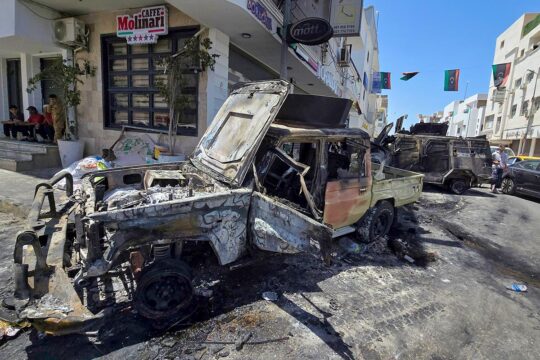The Russian mercenary group Wagner is a shadowy military outfit comprised of private fighters that has been linked to the Kremlin's wars in Ukraine, Africa and the Middle East.
France and Germany this week warned West Africa's Mali against a reported deal with Wagner amid claims that the country is close to hiring 1,000 mercenaries of the secretive Russian group.
- Guns for hire -
Reports of Wagner's existence emerged at the beginning of the war in Ukraine, which was sparked in 2014 and spurred allegations the Kremlin was backing a separatist insurrection in the east of the country.
The group later reappeared in Syria, where it bolstered the embattled regime of President Bashar al-Assad and was accused by Russian media of torturing detainees and securing oil assets.
Wagner fighters have since resurfaced in politically volatile African countries like the Central African Republic as military "instructors" and Libya, where they are propping up the rival administration of strongman Khalifa Haftar.
Apart from buttressing official Russian military operations, as in Syria, Wagner is reported to have also played the traditional role of a private security company elsewhere.
- Putin's 'chef' -
Wagner is believed to be financed by 60-year-old businessman Yevgeny Prigozhin, who has been hit with EU and US sanctions for destabilising Libya and meddling in US elections.
Prigozhin spent nine years in prison for fraud and theft towards the end of the Soviet Union, emerging as a catering magnate with Kremlin contracts after the Soviet collapse.
He was hit with sanctions by Washington, which said his troll factory was behind 2016 election interference. Prigozhin has denied links to Wagner.
Day-to-day operations were reported by the Russian state-run TASS news agency to be overseen by former military intelligence officer Dmitry Utkin, who was hailed at a "heroes of Syria" ceremony in 2016 and photographed with Putin.
- Secretive funerals -
The group, which like all private fighting companies is outlawed in Russia, is understood to recruit from law enforcement agencies and the military, wooing prospective soldiers with salaries five or six times larger than the average in Russia.
Several local Russian news sites have reported from funerals in Russia of suspected fighters saying families receive large payouts in exchange for their silence.
The Carnegie think-tank has described Wagner as "one of Moscow's worst kept secrets".
It said the group has two primary goals: "To provide the Kremlin with plausible deniability when deploying fighters in war zones" and be "a ready-made capability for building influence with receptive states".
- Unwanted attention -
Its operations however have not been without losses or scandal.
Belarus last year detained 33 "militants" from the group, accusing them of planning riots with the opposition ahead of elections.
The men claimed they were transiting through the Belarusian capital Minsk to destinations including Venezuela, Libya, Cuba, Turkey and Syria, in an embarrassing admission for Moscow, which discreetly secured their release.
Dozens of Wagner contractors are believed to have been killed and wounded in the Syrian province of Deir Ezzor in 2018 during a operation to claim oil facilities guarded by US troops and their proxies.
In July the same year, three journalists researching Wagner's operations in the Central African Republic for an investigative media outlet were killed in an ambush.
Activists have accused Wagner of committing "war crimes" in Syria, while the United Nations has suspected the group of human rights violations in the Central African Republic.


